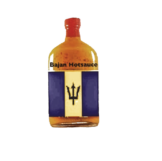SHE NAME PIN ‘PON SHE
Dialect is a funny thing. In Barbados, before independence, if one spoke dialect it generally indicated someone with little education. In school, children were encouraged to speak “the Queen’s English” so that, when they finished school, they could get a good job. But some time after independence, dialect came back into favor and now, in Barbados and the other independent West Indian islands, one’s dialect is a badge to be worn proudly. Even some children of born to emigrants living in the US or UK who may have never stepped foot in their parent’s home country, try to foster the accent they hear from their parents and their parents’ friends; they want to be identified by their heritage.
But the story I want to share happened long ago while colonialism ruled and the divide between Bajans of African descent and those of European, primarily British, was deep and wide. You rarely saw the white Barbadians around the blacks unless it was at an elite club or function where the blacks performed services like preparing the food, serving drinks and food, or ensuring the comfort of the white citizens. One of the few places of interaction on a slightly different level was the Anglican Church. Because the vicar was there to serve the parish, which included both plantation owners and workers, he performed the usual functions of marriages, funerals, and christenings. This story is about one of those events.
Vicar Whiteside was assigned to serve St. Joseph parish. His was a familiar face to most, even those that attended the few non-Anglican churches in the parish. He visited the schools, on occasion, for morning prayers or to oversee ceremonies and other events. On this particular day, he was to perform a christening for one of the poorer families in Chimborazo. This couple already had seven children and really couldn’t clothe and feed them properly, but now number eight had come along and needed to be blessed by the church.
Now, Mr. And Mrs. Armstead had only seen the parish priest from a distance, sitting in the rear of the big church on a Sunday morning. But they heard from others that his hearing was bad and that he struggled to understand dialect. They even heard about some of the mix-ups on names that he wrote down when filling out the documents for the christening. It seems he would add a letter or change a letter, and the child’s name wouldn’t match their birth certificate! They wanted the christening to go smoothly so they asked the headmaster at St. Bernard’s to print the name they had chosen for their baby girl, onto a slip of paper. Neither of them could read or write, but they trusted Mr. Fielders to spell it right for them so it would be correct on the forms the vicar was to fill out.
On this bright, clear morning, the Armstead’s carried the baby to the church with their other seven children following behind, tallest to smallest, like stair-steps. The church was dark; the only light filtered in through stained glass window. The sanctuary still smelled of incense used for the morning service. Family and friends had remained after the service to see the christening. The vicar motioned for them to come to the front.
He gathered the family around the font and then whispered to the father, “Have you a name for the child?”
Yessir, she name pin ‘pon she,” he replied.
Unsure if he had heard correctly, the vicar leaned over to the mother, “Could you tell me that name again?”
Mrs. Armstead nodded, and replied in as strong a voice as she could, “She name pin ‘pon she!”
The vicar shook his head in wonderment. ‘You never know what these people will name their children!’ he thought. Then he sprinkled the water according to custom and said, “Pinponshe, I baptize you in the name of the Father, and of the Son, and of the Holy Ghost. Amen.”
Mr. Armstead looked at his wife, and she at him in alarm, but the vicar paid them no mind. He dismissed them to sit down and stepped out to finish the paperwork. When they received it from him and saw PINPONSHE ARMSTEAD written for their child, they were dismayed.
They joined their family for the dinner afterwards, but didn’t feel like celebrating. Mr. Armstead received his plate of cucumber and onion pickle and stew food covered with salt fish sauce. A slice of lime to squeeze on it was the finishing touch. He reached for a malt and said, “my poor chil’ stuck wi’ de name Pinponshe cause a dat foolish man!” His wife nudged him, “you en’ to talk bad ‘bout de Lord’s ‘nointed da way! Now, pass de hot sauce, an’ hesh ya big mout’!”
Bajan hotsuace: Story by Jeanne Brooks

